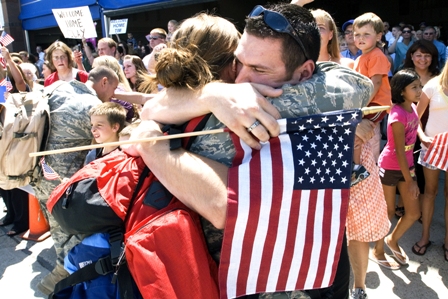
Iraq War Veteran and Security Fellow
with the Truman National Security Project
Posted: February 24, 2010 12:49 PM
The Iraq War finally has inspired a movie that has received an
Academy Award nomination for Best Picture -- The Hurt Locker.
The story focuses on three soldiers of an explosive ordinance disposal
(EOD) team who face death in Iraq on a daily basis.
The main characters are portrayed as conflicted individuals; soldiers
who are vulnerable to losing their sense of humanity as they face
intense fear on the streets of Baghdad while trying to dispose of
roadside bombs.
Having served in Iraq, I found it easy for my defense mechanisms to
focus on the details, rather than on the human story that it attempts to
convey -- which is by far the film's greatest strength.
'Hurt locker' is a phrase used to describe a really bad place. It's a
place a person goes after being severely injured. The phrase seems to
allude to a physical injury or death, but it carries greater weight in
the context of this movie. The hurt locker also seems to describe the
mental state that war creates in many soldiers.
A quote at the beginning of the film states that "war is a drug".
This narrative is captured through the portrayal of Sergeant First Class
William James, a sort of renegade non-commissioned officer who appears
both somewhat reckless, and yet, extremely calculating as a bomb
disposal specialist.
Sergeant James first enters the story after the bomb disposal team
loses its leader in a botched mission. The previous team leader loses
his life even as he displays text-book tactics in approaching a mission.
Sergeant James seems comparatively reckless and is viewed as
unpredictable by his new team, which includes two other soldiers,
Sergeant Sanborn and Specialist Eldridge.
The movie is action packed -- behind every corner is another threat
that the viewer expects to finally claim the life of the protagonist.
Throughout the film, Sanborn and Eldridge wrestle with the tension and
danger that their leader so readily embraces. The junior members of the
team are forced on the same journey as Sergeant James. At first they
fear for Sergeant James's life. Very soon, however, they begin to focus
on their own.
The youngest of the team, Specialist Eldridge, maintains a sort of
youthful innocence through his combat experience. You get the sense
that Eldridge could reintegrate into civilian society easily. The more
senior and experienced Sergeant Sanborn seems more troubled than his
younger counterpart and grapples with a decision throughout his tour --
either let go of fear and become more like Sergeant James, or get out of
the game.
This drew me in closely -- to let go of fear and embrace the love of
adrenaline, is it necessary to let go of other loves and possibly loved
ones? With each mission to defuse road-side bombs, Sergeant Sanborn and
Specialist Eldridge choose to let go of their mortality to some degree,
and hence their sense of humanity. If they don't, they risk losing
their minds and ability to function as soldiers.
The film also explores, what I believe to be, more ironic aspects of
the combat environment.
Lieutenant Colonel Cambridge is an Army doctor who offers
psychological support to Specialist Eldridge. It is ironic, that the
seemingly normal Eldridge is in the most need of support, since the
young soldier would most likely function normally in civilian society.
Sergeant James and Sanborn seem to have less in common from those in
civilian society after years in military service. Yet, in war, we need
our troops to function under extreme stress. It is not natural behavior
and explains much of the difficulty soldiers face when readjusting to
civilian life.
At one point, the young Eldridge invites Colonel Cambridge, who
rarely leaves the safety of Camp Victory, to accompany the team on a
mission. The doctor's clinical knowledge of the combat environment is
eventually tested by the gruesome reality of war. By the end, it is
apparent that the younger Eldridge better understands that there is no
effective way to face the prospect of death in combat.
The end of the movie is most poignant to me, as we see a soldier used
to the stress of combat take on the mundane task of picking out a box
of cereal at a grocery store after returning home. Many combat veterans
live the same reality -- coming home to a vastly different environment
after dealing with the stress of combat.
In this way, a veteran might take for granted the scenes that
civilian film watchers will find so moving.
By the end of the film, the audience comes to appreciate that the
experience isn't something that happens overseas -- the characters have
real lives at home. Since I was there, I'm not sure whether that makes
my take more or less valid. What I can say for sure is that some of
underlying themes caused me to reflect on my own journey through combat
and readjustment.
I can't help but wonder -- Is it possible that every soldier that
serves in combat leaves a part of themselves in the hurt locker?
The opinions expressed in this commentary are solely those of Ryan
McDermott.
 A welcoming home for our Troops.
A welcoming home for our Troops.

